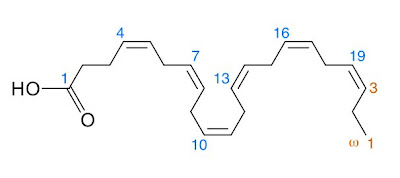Docosahexaenoic acid (DHA), a component of fish oil, is a powerful therapeutic agent that can protect brain tissue and promote recovery in an experimental model of acute ischemic stroke, even when treatment is delayed by up to five hours.
These findings not only target a new stroke treatment approach, but also provide vital information about the length of the therapeutic window. The NIH-funded research is published in the journal, Translational Stroke Research, now available online at http://dx.doi.org/10.1007/s12975-010-0046-0.
Ischemic strokes result from loss of blood flow to an area of the brain due to a blockage such as a clot or atherosclerosis. The damage includes an irreversibly injured core of tissue at the site of the blockage. The area of tissue surrounding the core, called the penumbra, is also damaged but potentially salvageable.
The penumbra has a limited life span and appears to undergo irreversible damage within a few hours unless blood flow is reestablished and neuroprotective therapy is administered. A cascade of chemicals floods the tissue along with restored blood flow, including damaging free radicals and pro-inflammatory enzymes which can cause further damage and cell death.
DHA is an essential omega-3-fatty acid and is vital for proper brain function. It is also necessary for the development of the nervous system, including vision.
Moreover, omega-3 fatty acids, found in cold water fatty fish, including salmon, tuna, mackerel, sardines, shellfish, and herring, are part of a healthy diet that helps lower the risk of heart disease. DHA has potent anti-inflammatory effects.
Since inflammation is at the root of many chronic diseases, DHA treatment has been widely demonstrated to have beneficial effects in patients with coronary heart disease, asthma, rheumatoid arthritis, osteoporosis, sepsis, cancer, dry eye disease, and age-related macular degeneration, but its potential benefit in stroke was not known.
“We are just now beginning to understand the significant impact of omega-3 essential fatty acids on stroke,” notes Dr. Bazan. “There is no simple solution just yet, but each new discovery brings us closer to defeating stroke and other debilitating neurodegenerative diseases.”
Subscribe to:
Post Comments (Atom)








No comments:
Post a Comment